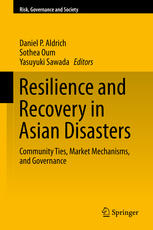

Most ebook files are in PDF format, so you can easily read them using various software such as Foxit Reader or directly on the Google Chrome browser.
Some ebook files are released by publishers in other formats such as .awz, .mobi, .epub, .fb2, etc. You may need to install specific software to read these formats on mobile/PC, such as Calibre.
Please read the tutorial at this link: https://ebookbell.com/faq
We offer FREE conversion to the popular formats you request; however, this may take some time. Therefore, right after payment, please email us, and we will try to provide the service as quickly as possible.
For some exceptional file formats or broken links (if any), please refrain from opening any disputes. Instead, email us first, and we will try to assist within a maximum of 6 hours.
EbookBell Team

0.0
0 reviewsThis book establishes a new, holistic framework for disaster recovery and mitigation, providing a multidisciplinary perspective on the field of risk management strategies and societal and communal resilience. Going beyond narrow approaches that are all too prevalent in the field, this work builds on an optimum combination of community-level networks, private market mechanisms and state-based assistance strategies. Its chapters describe best practices in the field and elucidate cutting-edge research on recovery, highlighting the interaction between government, industry and civil society. The book uses new data from a number of recent disasters across southeast and east Asia to understand the interactions among residents, the state, and catastrophe, drawing on events in Malaysia, Vietnam, Cambodia, Japan, China and Thailand. Grounded in theories of risk mitigation and empirical research, the book provides practical guidance for decision makers along with future research directions for scholars.
The Asian region is highly prone to natural disasters which devastate large and mostly poor populations. This book deals with some of the root issues underlying the continued vulnerability of these societies to catastrophic shocks. The book is unusual in that it comprehensively covers resilience and fragilities from community levels to market mechanisms and governance and it analyses these issues in very different economic and structural settings. Recommended for development and disaster risk managers—without question.
Professor Debarati Guha-Sapir
Director, Centre for Research on the Epidemiology of Disasters (CRED);
Professor, University of Louvain, Research Institute Health and Society.